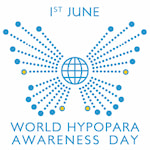World Hypopara Awareness Day Date in the current year: June 1, 2026
 World Hypopara Awareness Day, also known as World Hypopara Day, is observed annually on June 1. It was created to raise awareness of hypoparathyroidism, a rare disease characterized by low levels of parathyroid hormone.
World Hypopara Awareness Day, also known as World Hypopara Day, is observed annually on June 1. It was created to raise awareness of hypoparathyroidism, a rare disease characterized by low levels of parathyroid hormone.Parathyroid hormone (PTH), also known as parathormone or parathyrin, is produced by the parathyroid glands, which are located in the neck behind the thyroid gland. Its primary function is to regulate serum calcium and phosphates. Through its function, PTH influences the process of bone remodeling, where old bone tissue is replaced by new bone tissue.
Hypoparathyroidism occurs when the parathyroid glands do not produce enough PTH. The most common cause is a complication of anterior neck surgery that results in damage to the parathyroid glands or their blood supply. Less common causes include an autoimmune reaction, certain genetic conditions (such as Kenny-Caffey syndrome or DiGeorge syndrome), iron overload, and magnesium deficiency.
Low PTH results in low serum calcium (hypocalcemia), which interferes with normal nerve conduction and muscle contraction. As a result, the main symptoms of hypoparathyroidism are paresthesia (a sensation in the skin that can feel like numbness, prickling, tingling, or burning), muscle cramps, and severe muscle spasms called tetany. Other symptoms may include headaches, insomnia, fatigue, and bone pain. Severe hypocalcemia may cause seizures, arrhythmia, laryngospasm, or bronchospasm.
Hypoparathyroidism is usually diagnosed by blood tests to determine blood calcium and PTH levels. Testing PTH levels is necessary to rule out other conditions that can cause hypocalcemia, such as pseudohypoparathyroidism (insensitivity to PTH), vitamin D deficiency, kidney disease, and malabsorption.
Short-term treatment for severe hypocalcemia is intravenous calcium, usually in the form of calcium gluconate or calcium chloride. Long-term treatment of hypoparathyroidism usually involves calcium and vitamin D supplementation, with regular monitoring of calcium levels to prevent complications such as kidney disease. Recently, recombinant PTH has been approved for patients who do not respond to conventional therapy, but it is expensive and not readily available.
The prognosis for hypoparathyroidism depends on its cause, severity, and treatment. Postoperative hypoparathyroidism usually resolves within six months in 75% of cases as the parathyroid glands heal. Chronic hypoparathyroidism caused by permanent damage to the glands, their removal, or other causes is usually a lifelong condition that requires ongoing treatment. It does not shorten life expectancy with proper management, but it can significantly affect quality of life.
World Hypopara Awareness Day, also known as World Hypoparathyroidism Day or simply World Hypopara Day, is observed annually on June 1. It was founded by the HypoPARAthyroidism Association, Inc. and is supported by several charities that help patients with hypoparathyroidism around the world. The main goals of the awareness day are to educate the public about this rare disease and its impact on patients and their families.
- Category
- International Observances
- Tags
- World Hypopara Awareness Day, World Hypopara Day, World Hypoparathyroidism Day, awareness days, international observances